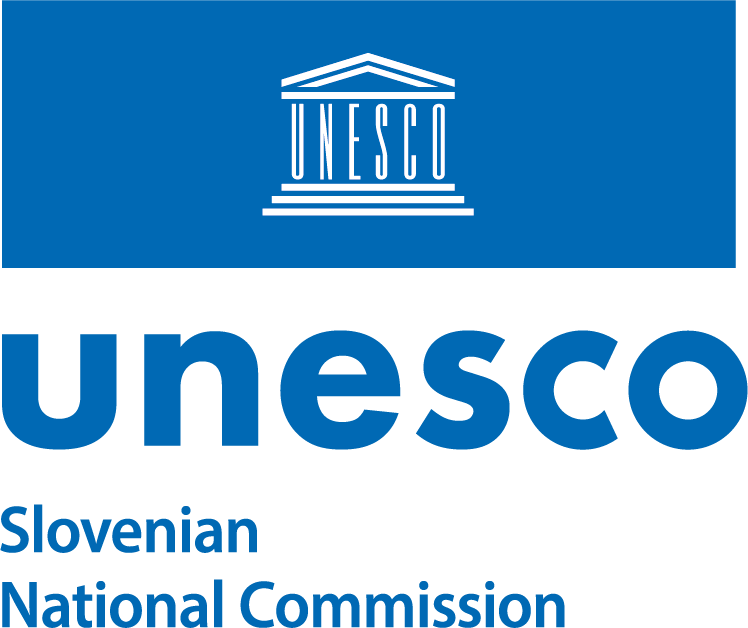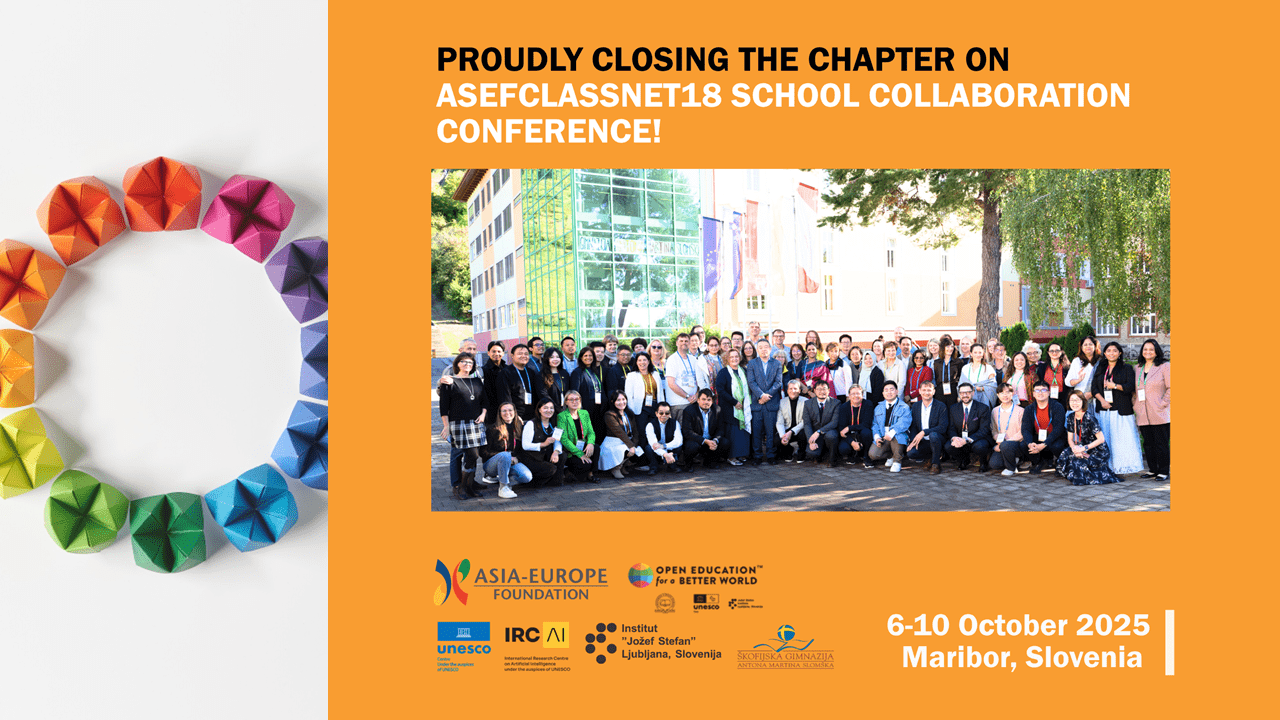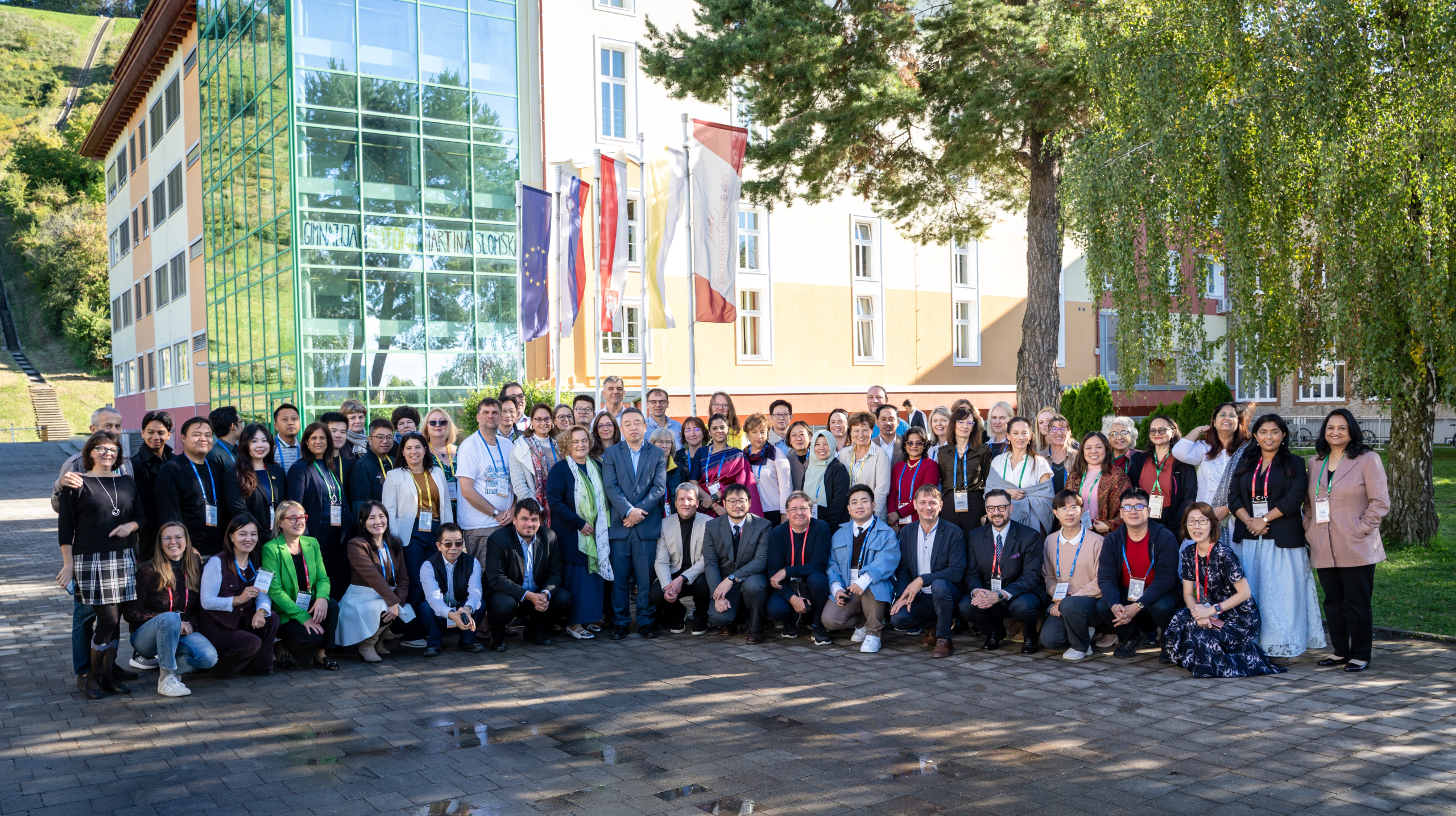ASEFClassNet: A Collaborative Community for Teachers in Asia and Europe
Imagine a teacher training programme, that goes beyond improving pedagogical skills – it fosters innovation, collaboration and co-creation among educators. That is exactly what the ASEFClassNet School Collaboration is about!
For over two decades, the ASEF Classroom Network has connected secondary, high, and vocational school teachers across Asia and Europe, providing them with opportunities to experiment, share ideas, and develop creative solutions to common educational challenges. More than 2,800 teachers have taken part in its activities, impacting over 40,000 students through over 125 Innovative Teaching Practices, 430 collaborative projects and local spin-off initiatives. Learn more about the Project series here.













ASEFClassNet18 School Collaboration
Building on survey findings and teachers’ areas of interest, ASEFClassNet18 School Collaboration focuses on “Effective, Inclusive, and Ethical Artificial Intelligence in Education (AIED) Design.” The project aims to amplify teachers’ voices, enhance their capacity, and address gaps in discussions and resources on AIED. By bridging the educational ecosystem with EdTech designers, ASEFClassNet18 seeks to empower teachers and shape the future of learning.
The ASEFClassNet18 School Collaboration is a 7-month (May-November 2025) hybrid knowledge and capacity-building project for teachers and school leaders at the secondary education level. It aims to enhance teaching & learning environments in secondary, high, and vocational schools across Asia and Europe on the above-mentioned topic. To achieve this aim, the ASEFClassNet18 School Collaboration project activities are for teachers and school leaders at the secondary education level to develop their knowledge on the topic as well as advocacy and leadership skills for integrating ethical and effective AI innovation in classrooms across Asian and European schools.
About the Topic
What is AIED and AIED Design?
AIED, or Artificial Intelligence in Education, refers to the integration of AI technologies into educational practices and systems to enhance teaching and learning experiences and outcomes. AIED Design, on the other hand, refers to the process of creating and developing AI-enabled educational tools and systems. This includes designing user-friendly interfaces, ensuring the alignment of AI features with educational goals, and considering ethical implications such as data privacy. The goal of AIED Design is to create innovative, accessible, and effective AI-powered solutions that enhance the teaching and learning process.
Why Focus on “Effective, Inclusive and Ethical” AIED Design?
Today, AI-enabled tools continue to evolve and spread in the field of education. Hence, their potential to enhance teaching and learning in the secondary and vocational education sectors must be carefully explored. A growing list of institutions, such as UNESCO, the Council of Europe are actively advocating to make AI-driven digital transformation in education relevant, effective, inclusive, and ethical. In this programme, we will discuss the following aspects:
- Effectiveness: Educators will understand how AI can enhance learning outcomes, effective and engaging instruction, and provide adaptive feedback. By deepening understanding of effectiveness, educators can harness AI meaningfully to enhance learning outcomes, rather than replace pedagogy.
- Inclusion: Educators will learn to recognise how AI can unintentionally reinforce biases or exclude certain students. By understanding inclusive design, they will learn to identify and mitigate biases, and advocate for fairer AI systems where all learners benefit from AI-driven education.
- Ethics: Data privacy, transparency, and responsible AI use must be at the core of EdTech innovation. In this context, educators play a key role in safeguarding student data, ensuring AI transparency, and addressing ethical concerns. Educators will learn how to safeguard student rights, make informed decisions, and build trust in AI-enhanced education.
ASEFClassNet18 will explore these three distinct yet interconnected elements of AIED Design to empower teachers to evaluate and implement AI-driven tools effectively, inclusively, and ethically in their teaching practices.



Participants
Citizens from Asian and European countries* who are:
- Teachers, school leaders, and any educators at the secondary, vocational, or high school level based in an ASEM* country.
*Asia: Australia, Bangladesh, Brunei Darussalam, Cambodia, China, India, Indonesia, Japan, Kazakhstan, Korea, Lao PDR, Malaysia, Mongolia, Myanmar, New Zealand, Pakistan, Philippines, Singapore, Thailand and Viet Nam.
*Europe: Austria, Belgium, Bulgaria, Croatia, Cyprus, Czech Republic, Denmark, Estonia, Finland, France, Germany, Greece, Hungary, Ireland, Italy, Latvia, Lithuania, Luxembourg, Malta, Netherlands, Norway, Poland, Portugal, Romania, Slovakia, Slovenia, Spain, Sweden, Switzerland and the United Kingdom.


Programme Design
Programme of the ASEFClassNet18 School Collaboration consisted of 4 stages:

Participants will learn from and interact with experts on the thematic/technical areas to build relevant knowledge on the project themes to improve their knowledge and understanding. They will take part in self-reflective exercises on the lessons learned from thematic and/or technical sessions. It includes 5 Sessions in the format of webinar, workshops and live demonstration of AI-enabled tools creation around the topic below:
- Fundamental of AIED Design
- Effectiveness AIED Tool Design
- Inclusive AIED Tool Design
- Ethical AIED Tool Design
- AIED Tools Exploration
Participants will be teamed up to work together on designing an ASEFClassNet Innovative Teaching Practice (ITP) by using an AI tool of their choice.
During this phase, participants collaborate with Mentors, who are ASEFClassNet alumni, including experienced teachers and experts. This phase has two key elements:
(1) ITP Team Building
Participants will be teamed up in teams of three, to jointly agree on and develop an Innovative Teaching Practice (ITP). Activities at this stage will help team members to build effective, collaborative relationships with the support of their mentors. Teams will engage in ideation and start developing potential concepts their ITP project. As they engage in meaningful discussions and collaborative exercises, they will learn how to work together effectively, drawing on each other’s strengths. This team-building phase is essential for ensuring that both participants are aligned on their vision, approach, and responsibilities throughout the development of their Innovative Teaching Practice (ITP).
(2) ITP Design
The teams start developing their Innovative Teaching Practice (ITP) that will later become an Open Education Resource. Teams will focus on creating a lesson plan that integrates AI-enabled tools and leads towards specific learning outcomes for their students. They will consider factors such as effectiveness, inclusivity, and ethics. This process will involve research, critical thinking, and iteration to ensure that the ITP is practical, innovative, and aligns with best practices in the field.
After the self and team learning stages, participants will further strengthen their knowledge and pedagogical skills by putting their knowledge into action. They will implement their designed Innovative Teaching Practice (ITP) in their own classrooms/schools, with the support and advise from the Mentors.
Note: The on-site conference is scheduled for early October 2025, following the completion of the Action Learning phase in September. If held in mid-September instead, participants will attend the conference first and complete the Action Learning phase afterward.
A 4.5 day long on-site conference to bring the best performing ITP teams of ASEFClassNet18 together. Participants will be invited based on their contribution and proposed ITP in the online phase, to showcase and further develop their ideas during the onsite conference.


What Teachers Participants Will Achieve?
- Co-creation experience of high-quality Innovative Teaching Practices (ITPs) with peers and present work at an international conference
- Knowledge enrichment through discussions, peer learning, and cross-cultural cooperation between Asia and Europe
- Confidence, collaboration, and leadership skills that extend beyond the classroom
- Connections with peers and AIED experts from 50 countries across Asia and Europe, enhancing collaboration and exposure
- Empowerment, support and inspiration fellow teachers by sharing resources and experiences, creating a ripple effect within and beyond the programme
Testimonials from the ASEFClassNet17 Participants

Learn more about the previous edition #ASEFClassNet17 School Collaborations here:






















